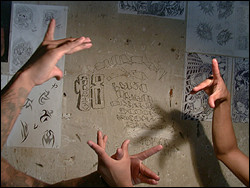
18th Street gang hand signs, Guatemala City, March 30, 2001.
March 28 Guatemala City
Several weeks ago there were rumblings about an attempted coup. Nearly every day the papers report corruption in high places. The owner of one newspaper--El Periodico--was accosted by masked men who warned her that she'd be sorry if the paper kept investigating a banking scandal. Most people say cronies of the current President are involved.
"In Guatemala the rich people live by double standards," 24-year-old Jorge De Leon tells me. "They are thieves, but they kill us saying we are thieves. No one cares. At least gang members are honest. If gang members rob, they say it. If they take drugs they say it."
Jorge got involved in gangs at an early age.
"My mom was half crazy. She abandoned me when I was six. When she left I used to cry every night and I became resentful because I couldn't express my feelings openly. I kept a lot of things inside. My father left too. He joined the guerrillas. I grew up with my grandmother in a barrio full of gangs. The violence felt good to me. I was getting out my feelings."
But according to Jorge the street violence now between two gangs Mara Salvatrucha and 18th Street is more deadly than the old style of fighting in his day.
Jorge still hangs out with gang friends. He makes tattoos. After being
stabbed and locked up in prison many times, he decided to go to art school. He shows me some photos a friend took of a performance piece he did at an art museum here.
"My father's family was involved in politics. My grandmother and my uncle were murdered by the army. Other family members were disappeared."
"My generation are growing up with a different war. Guatemala is a country where no one speaks the truth. I realized that in the gangs I was committing suicide slowly. I wanted to make a work of art to shock people and to make them see none of us are telling the truth. So I sewed my mouth shut."